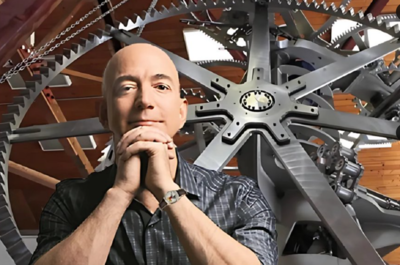ARTICLE AD BOX

Jeff Bezos' stress-busting advice for parents: Transforming stress into fun through teamwork (Image: Pexels)
A child once asked Jeff Bezos what keeps him going when times are rough and the Amazon founder answered simply: when he is stressed it is usually because he is not doing anything about the problem. So he listens to his body, identifies the source, takes the first step, finds allies, then gets a group of inventors together to solve it.
“As soon as you start doing that, it turns from something that might create stress into something that creates fun,” he said.That answer is surprisingly useful for parents. Parenting is full of stressors including tantrums, exam seasons, sibling fights and teen privacy struggles and Bezos’ advice maps onto decades of psychological research on stress, coping, social support and teamwork. His instinct (to treat stress as a signal to act, then seek allies and invent solutions together) is more than a CEO mantra.It aligns with decades of psychological science that bodily awareness helps regulate emotion, problem-focused action reduces rumination and physiological arousal, social support buffers stress and collaborative problem solving increases motivation and creative solutions. This is good news for parents as they don’t have to “fix” everything at once.
Listen to the body: Bodily signals and emotion regulation
Bezos said, “I’m listening to my body as a signal that something is awry.” A 2018 study in the Frontiers in Psychology, reviewed evidence that being aware of internal bodily signals (heart rate, breathing, tension) helps people label emotions and choose adaptive responses.
For parents this means noticing a racing heart or tight jaw when they react to a child is a useful signal to pause, rather than proof they have lost control. Small checks like one breath, a five-count or a calming strategy can give you mental space to act instead of react.
Take a first step: Problem-focused coping reduces stress
Bezos shared, “The stress goes away the second I take the first step - identify the source.” Another Frontiers in Psychology study published in 2019 highlighted two broad strategies: problem-focused (take action to change the stressor) and emotion-focused (manage feelings about it).
Reviews found that when a stressor is controllable (a missed deadline, household logistics, a study plan), problem-focused coping or breaking it into a first small step reduces physiological stress and rumination. Parents can pick one small, concrete step (call the teacher, set a 10-minute routine, ask for help) and the physiological arousal often drops.
Stop rumination by acting (and prevent stuck thinking)
Bezos revealed, “If I’m stressed I’m usually because I’m not doing anything about it.”
Studies show repetitive negative thinking (rumination) prolongs stress and predicts worse mood. Behavioural activation like doing a small, goal-directed action interrupts rumination. For parents, this means that the act of beginning a solution (even a tiny one) often reduces the mental loop of worry and gives a sense of control.
Find allies as social support buffers stress
Bezos recommended, “Talk to somebody about it. Find allies.” A 1985 research in Psychological Bulletin established that social support mitigates the negative effects of stress and enhances psychological adaptation.
The buffering hypothesis showed that people with supportive relationships experience weaker negative effects from stressful events. For parents, allies can be partners, grandparents, teachers, paediatricians, or other parents. Simply sharing the problem reduces perceived burden and often brings practical solutions (childcare swaps, perspective, resources).
That social connection is part of why Bezos said, “As long as I have allies, there's nothing more fun than getting in a room with a group of inventors saying, "look, here's the problem.
Let's invent a solution to it" and as soon as you start doing that, I find that it turns from something that might create stress into something that creates fun.” Allies transform stress into shared problem-solving.
Research on group creativity and teamwork shows mixed findings (brainstorming needs rules) but overall collaborative approaches, when well structured, increase idea generation, engagement and intrinsic motivation. Parents can involve children in solution-finding by making a “family inventors’ meeting” to solve chores, schedules or homework strategies. When kids co-design solutions they are more motivated to follow them and the task becomes playful rather than punitive.
That shift from paralysis by worry to playful action with allies is exactly what Bezos describes and the research shows it works.



.png)
.png)
.png)
















 2 hours ago
3
2 hours ago
3







 English (US) ·
English (US) ·